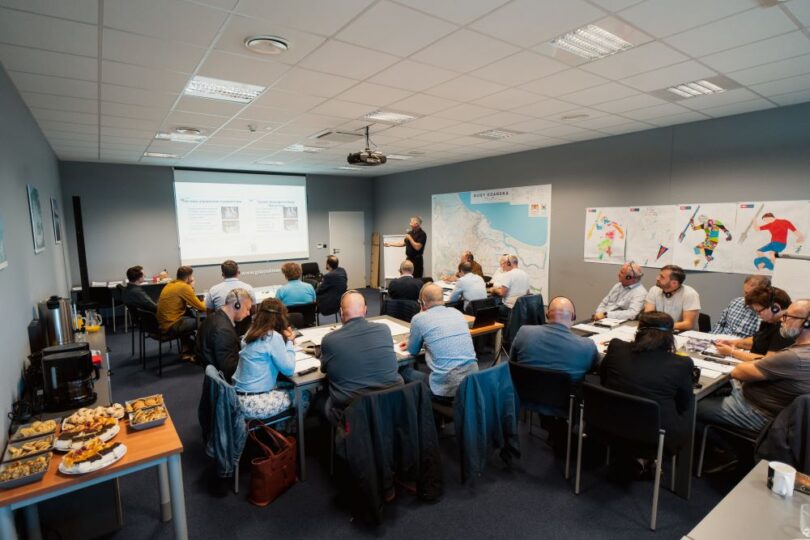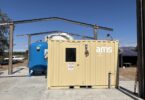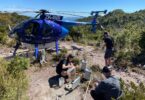Can you provide an overview of the mission and objectives of Operators Without Borders?
Operators Without Borders (OWB) is a Vancouver-based charity dedicated to supporting water and wastewater utilities in developing countries, particularly in disaster-affected regions. Its mission is to restore safe drinking water and effective wastewater management services while emphasizing sustainability, local capacity building, and alignment with the United Nations Sustainable Development Goals (SDGs).
OWB focuses on disaster preparedness, response, recovery, and capacity building, offering:
- Technical Assistance: Conducting operational assessments, developing over 225 operational standard operating procedures (SOPs) provided free of charge, and delivering specialized technical training in collaboration with organizations like CAWASA.
- Training Programs: Providing laboratory and safety training, Incident Command System (ICS) workshops, and disaster response courses. Training has been delivered to over 500 professionals globally, including ICS levels 100 through 300 in the Caribbean, South America, and Ukraine.
- Specialized Workshops: Developing and delivering workshops such as the Chemical, Biological, Radiological, and Nuclear Contamination of Water Supplies program, which trained 110 participants.
OWB’s initiatives prioritize sustainability, collaboration, and safety to build resilience in water and wastewater utilities.
How did Operators Without Borders originate, and what inspired its founding?
OWB was founded in response to the urgent need for skilled water utility assistance following Hurricanes Irma and Maria in 2017. Bernard Ettinoffe, General Manager of Dominica Water and Sewerage Company (DOWASCO), highlighted Dominica’s critical need for help during his keynote address at the CWWA conference in Guyana. This inspired Valerie Jenkinson to mobilize certified operators from Canada and the United States for recovery efforts. Since then, OWB has provided services valued at nearly $2 million worldwide, supported by over 100 volunteers. Post-COVID, OWB has resumed impactful on-site workshops.
Can you share some success stories or impactful projects that Operators Without Borders has completed?
OWB’s notable success stories include:
2024
- September: Met with and interviewed industry leaders, regulatory bodies, and utilities as part of a Canadian High Commission initiative to analyze water and wastewater sectors in Kenya, Nigeria, and South Africa. The study identified challenges such as aging infrastructure, non-revenue water losses, and limited regulatory enforcement. Recommendations focused on Canadian clean technologies, including decentralized wastewater systems, lagoon revitalization, and energy-efficient solutions. Capacity-building efforts aimed to strengthen local expertise and promote sustainable water management across African industries.
- April: Delivered second certified training session for Level 1 Water Distribution and Wastewater Collection to Nakuru Water and Sewerage Company (NAWASSCO) Operators in Kenya, as part of a UN Habitat and Global Wastewater Initiative (GWI) pilot project. This initiative underscores OWB’s role in raising industry standards and fostering international collaboration. Four operators achieved certification.
2023
- November: Delivered an ICS Level 200 workshop in Gdansk, Poland, for Ukrainian and Polish water professionals.
- November: Collaborated with WPI and the UNEP to deliver wastewater treatment training in Nakuru, Kenya, as a pilot program. Two operators achieved certification.
- July: Conducted a two-day WaSH workshop for Ukraine’s Water Quality Technical Advisory Committee on Chemical, Biological, Radiological, and Nuclear (CBRN) contamination of water supplies. Training was applied following the Kakhovka Dam destruction.
- January to April: Developed and delivered Train-the-Trainer workshops and Exam Preparation Training for wastewater collection and treatment operators in Barbados, St. Lucia, Grenada, and Belize.
2022
- November 2022 to September 2023: Created a guidance document on containerized water treatment units for use in Ukraine during and post-war.
- September 2022 to August 2023: Delivered Level 100 ICS workshops via Zoom for 335 registrants from Ukrainian and Polish water utilities and ministries.
2021
- June to August: Delivered ICS Level 100 and 200 training to CARILEC members operating national electrical utilities in the Caribbean.
- 2021 to Present: Partnered with CAWASA to provide technical training to regional water and wastewater utilities and speakers for webinars on disaster recovery and utility operations.
- Participated in Technical Study: Collaborated with Dalhousie University to address a wastewater effluent issue at AySA, Argentina’s major utility serving 10 million customers.
- May to June: Delivered a Level 100 ICS workshop in Spanish to AySA with support from the Canadian Trade Commission.
2020
- 2020 to Present: Partnered with HANWASH in Haiti to deliver potable water to seven communes. Developed unique SOP templates for personnel and participated in technical feasibility studies and capacity building. Through training and technical support contributions, OWB helped reduce non-revenue water levels in Pignon, Haiti, from 80% to 35%.
- December 2020 to February 2022: Conducted a Gap Assessment on emergency management programs for the Bahamas, Barbados, and Haiti, contributing to the revision of guidelines for hydrometeorological events and creating emergency response protocols.
2019
- October to December: Sent five teams to assist Grand Bahama’s Port Authority with safety repairs, and water quality management in recovery after Hurricane Dorian.
- July: Conducted an operational assessment of the Barbados Water Authority, covering operations, HR, finance, customer service, and procurement. Issued reports with 100+ recommendations.
- February: Delivered safety training to Belize Water Services (BWS), covering confined space, trenching, chemical spills, gas leaks, and traffic safety. Trained 120 staff, including the Emergency and Safety Committee.
- February: Conducted an operational assessment for BWS, inspecting all aspects of operations, issuing a report with 100+ recommendations, and establishing an ongoing advisory relationship.
2017
- November to December: Deployed to Dominica post-Hurricane Maria, assisting DOWASCO to restore water services in three villages, repair wastewater treatment plants, and train operators.Provided a 10-week, weekly, workshop for laboratory technicians for the new water Laboratory in Dominica
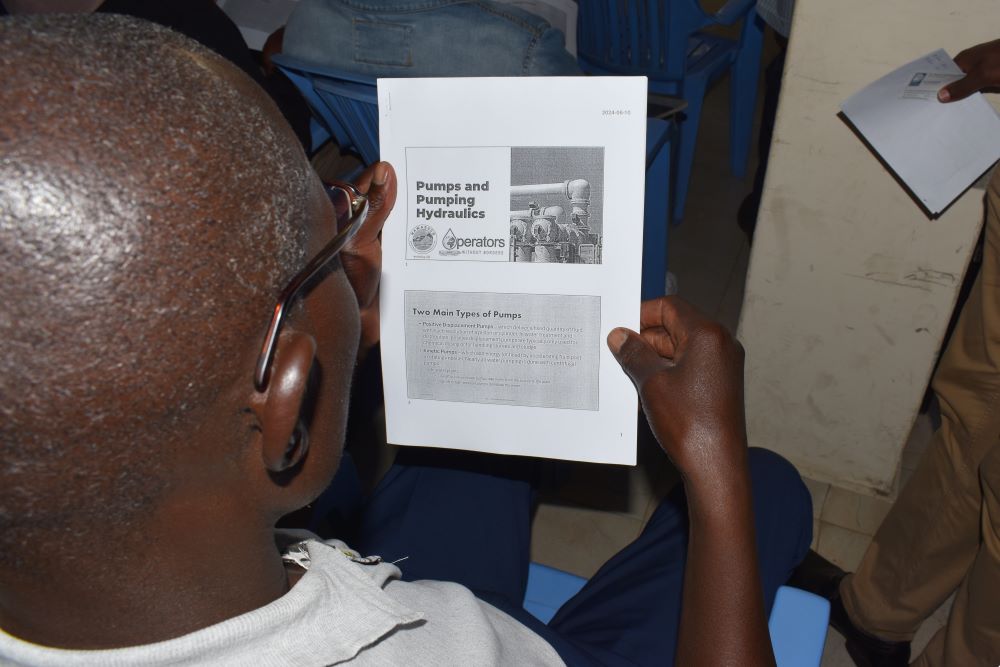
NAWASSCO operator Ezekiel holding a handout on the chapter presentation on pumps and pumping hydraulics being taught by OWB volunteer instructors.
What are some of the challenges your teams face when working in different regions, and how do you overcome them?
Challenges include logistical hurdles, varying local conditions, and cultural differences. OWB overcomes these by meticulously planning volunteer teams with diverse skill sets, fostering strong local partnerships, and emphasizing capacity building to ensure sustainable impact.
Can you describe any partnerships or collaborations with other organizations that enhance the effectiveness of Operators Without Borders’ assignments?
OWB is a WaSH Global Cluster Partner and an active member of WaSHLAC (Latin America and the Caribbean) and WaSH Ukraine. OWB collaborates with organizations such as Caribbean Water and Sewerage Association (CAWASA), United Nations Environmental Programme (UNEP), GEF, Rotary International’s
HANWASH initiative, Global Water Operators’ Partnerships Alliance (GWOPA), and others.
OWB is a Charity of Choice for Canadian Water and Wastewater Association (CWWA), Water Environment Federation (WEF), the Environmental Operators Certification Program (EOCP), Water & Wastewater Equipment, Treatment & Transport Show (WWETT) and are supported by many others includin
Who are OWB volunteers?
The majority of OWB’s volunteers are Canadian and US Operators working for water and wastewater utilities. In addition, volunteers include water professionals with expertise in disaster preparation and recovery. As OWB is based in Vancouver many of our volunteers are BCWWA members who want to give back and share their expertise with those utilities who are less fortunate. Volunteers donate their time and expertise, but OWB either pays all expenses for deployment and/or coordinates with the affected municipality/country to arrange lodging, food, and local transportation. Many volunteers have told us that assisting in these initiatives has changed their lives and they are eager for opportunities to help again.
How can individuals or organizations support the work of Operators Without Borders, whether through volunteering or donations?
Support can be provided through volunteering, donating, and/or becoming a member. Volunteers with relevant expertise are crucial for disaster response and training initiatives. We also look for volunteers who can help develop SOPs or work towards spreading awareness of OWB Donations help fund travel costs and operational expenses, ensuring the sustainability of OWB’s efforts. Membership is only CAD$50.00 for three years for an individual or CAD$150.00 for corporate membership.
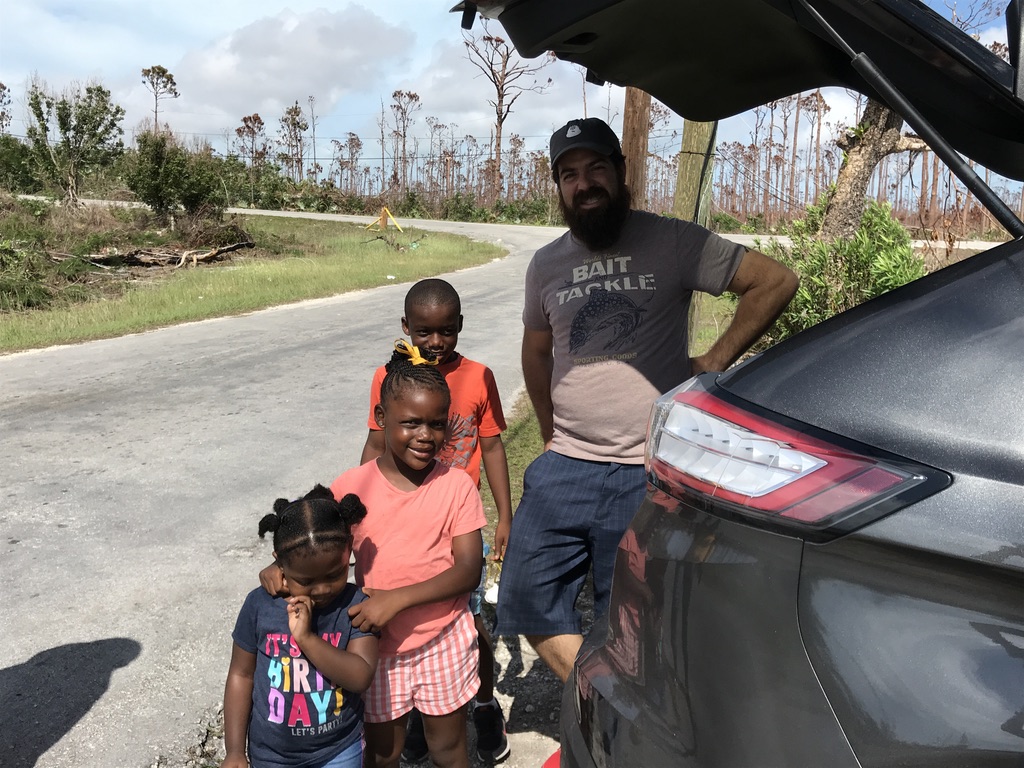
OWB volunteer Jason Mank assists a family in Grand Bahamas, whose home was destroyed by Hurricane Dorian in 2019, by providing gloves to help them clear the rubble.
What are the future goals and upcoming projects for Operators Without Borders, and how do you plan to achieve them?
Our aim is to continue to build resilience in water utilities in developing nations. There is a huge need to continue disaster preparedness, recovery and response. Future goals include expanding training programs and strategic partnerships globally. Initiatives like OWB Australia aim to enhance service delivery in Asia and beyond. OWB is preparing to respond to potential requests for aid in the Caribbean for the 2024 Hurricane season, seeking volunteers and donations for these efforts. OWB is also working to go further than being a UNICEF Associate to be a full Standby Partner.
How does Operators Without Borders ensure the sustainability and long-term impact of its projects after the initial implementation?
OWB emphasizes long-term capacity building through mentorship, coaching, operational assessments, and tailored recommendations. By training local Operators and developing operational frameworks, OWB ensures that communities can maintain and improve their water and wastewater systems independently. We maintain help and friendships with the Operators with whom we work around the world and are always a call away from following up on projects and ensuring they are sustainable.
What qualifications and skills are essential for operators and other professionals who volunteer with your organization?
Volunteers typically need certifications in water and wastewater operations, along with relevant field experience. Skills in disaster response, operational assessments, and capacity building are highly valued to address the diverse challenges faced in different regions.
In addition to operators, OWB welcomes professionals from various fields who can contribute to non-operational aspects of the organization:
- Logistics Experts: Crucial for planning and coordinating the transportation of equipment, supplies, and personnel to affected areas.
- Administrative Professionals: Help manage the day-to-day operations, ensuring that all processes run smoothly and efficiently.
- Budget and Finance Professionals: Oversee fundraising efforts, manage financial resources, and ensure compliance with financial regulations to support project sustainability.
- Marketing and Promotion Specialists: Develop and implement strategies to engage donors, recruit volunteers, and increase organizational visibility.
- Engineers: Provide technical expertise in designing and implementing water and wastewater infrastructure projects.
- Health and Safety Specialists: Ensure that all operations comply with health and safety standards to protect both volunteers and local communities.
- Environmental Scientists: Assess and monitor environmental impacts, ensuring that projects are environmentally sustainable.
- IT Professionals: Support digital infrastructure, manage data, and ensure effective communication systems.
- Human Resources Professionals: Manage volunteer recruitment, training, and support to maintain a skilled and motivated workforce.
- Legal Advisors: Provide guidance on regulatory compliance, contracts, and other legal matters to protect the organization’s interests.
- Fundraising and Development Professionals: Identify and secure funding opportunities to support OWB’s projects and initiatives.
- Communications Specialists: Create content, manage social media, and handle public relations to effectively convey OWB’s mission and achievements.
Together, these professionals create a comprehensive support system that enhances OWB’s ability to deliver impactful and sustainable water and wastewater management solutions in disaster-affected regions.
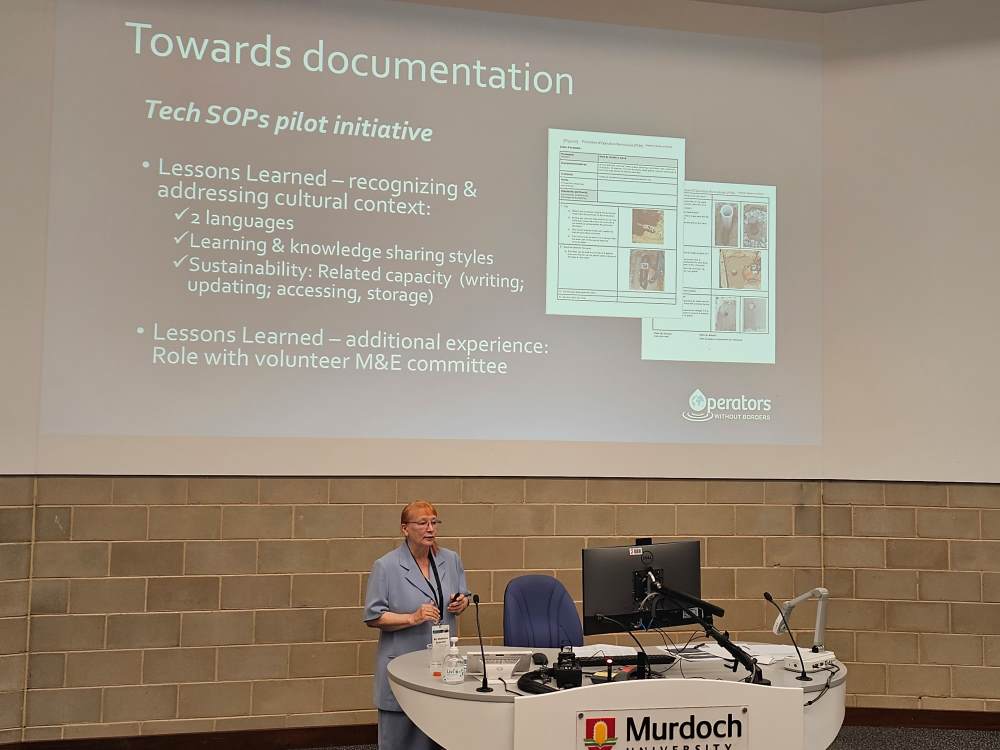
Madeleine Butschler giving an Operators Without Borders presentation at the IWA Conference held in Perth Australia (November 2023).
What are the benefits of having formalized charitable and fiscal sponsorship statuses in Canada and the US for Operators Without Borders?
OWB’s charitable status in Canada and fiscal sponsorship in the US enhance financial stability through fundraising, donations, and grants. These statuses enable OWB to provide tax receipts for donations, attracting more support and ensuring the organization’s growth and sustainability.



